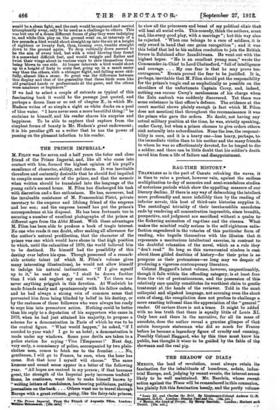THE PRINCE IMPERIAL.* M. FAIDN was for seven and a
half years the tutor and close friend of the Prince Imperial, and, like all who came into contact with him, formed the highest opinion of his pupil's eacellenee of character, ability, and charm. It was inevitable therefore and eminently desirable that he should feel impelled to compile some memoir of the prince, and that the memoir when written should be translated into the language of the young exile's second home. M. Filon has discharged his task with discretion and a fine enthusiasm. He has, moreover, had the invaluable assistance of M. Frauceschini Pietri, private secretary to the emperor and lifelong friend of the empress and her son; and the empress herself has put the prince's correspondence at his disposal. He has been fortunate too in securing a number of excellent photographs of the prince at different ages from the Abbe Misset. With these advantages M. Filon has been able to produce a book of tragic interest. No one who reads it can doubt, after making all allowance for the author's natural predilection, that the character of the prince was one which would have shone in that high position to which, until the calamities of 1870, the world believed him to be destined. He himself had the possibility of this destiny ever before his eyes. Though possessed of a remark- able artistic talent (of which M. Filon's volume gives many interesting illustrations), he would not allow himself to indulge his natural inclinations. "If I give myself up to it," he used to say, "I shall be drawn further than I wish and neglect my real work." Yet there was never anything priggish in this devotion. At Woolwich he made friends easily and spontaneously with his fellow cadets, and he had always a strong vein of common sense that prevented him from being blinded by belief in his destiny, or by the rashness of those followers who were always too ready to urge him into premature action. Nothing could be better than his reply to a deputation of his supporters who came in 1878, when he had just attained his majority, to propose a scheme for a demonstration in Paris of which he was to be the central figure. "What would happen," be asked, "if I acceded to your wish ? I go to an hotel ; a demonstration is made under my windows. Some poor devils are taken to a police station for crying Vive l'Empereur !' Next day, very early, a commissary of police, accompanied by two plain- clothes men, comes to fetch me to the frontier. ... No, gentlemen, I will go to France, be sure, when the hour has come. But that hour I myself will choose." The same humour and sound sense appear in a letter of the following year. "All hopes are centred in my person ; if that becomes great, the strength of the Imperial party increases tenfold." Some, he continues, want him to make himself known by "writing letters of condolenoe, harbouring politicians, patting journalists on the back. . . Others want me to travel through Europe with a great retinue, going, like tbe fairy-tale princes,
• TIM ?rifted_ Inlysrial. Prete the 'Frencb of Augustin Film. London: W1kmSleinsonsau. .• . . . to view all the princesses and boast of my political elixir that will heal all social evils. This comedy; think the authors, must end, like every good play, with a marriage "; but this way also he rejected. ." When one belongs to a race of soldiers, it is only sword in hand that one gains recognition " ; and it was- this belief that led to his sudden resolution to join the British forces in Zululand after Isandhlwana. He went out with the- highest hopes. "He is an excellent young man," wrote the Commander-in-Chief to Lord Chelmsford, "full of intelligence- and courage. . . . My one fear is that he may prove too courageous." Events proved the fear to be justified. It is,. perhaps, inevitable that M. Filon should put the responsibility- for the prince's tragic end as emphatically as possible on the- shoulders of the unfortunate Captain Carey, and, indeed, nothing can excuse Carey's carelessness of his charge when, the Zulu ambush was suddenly discovered. Yet there was. some substance in that officer's defence. The evidence at the
martial shows plainly enough (a fact which M. Filon, does not mention) that throughout the reconnaissance it was- the prince who gave the orders. No doubt, not having any actual military position at the time, he was, strictly speaking,. under Carey, but when a prince chooses to give orders others. sink naturally into subordination. None the less, the responsi- bility is ours, and it is a heavy one—less heavy, perhaps, to. the immediate victim than to his mother and the many friends. to whom he was so affectionately devoted, for he longed to die- a soldier, and there can be little doubt that his soldier's death, saved him from a life of failure and disappointment.










































 Previous page
Previous page